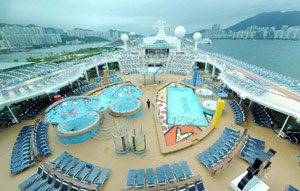
"It will mean that iron ore demand will grow at only 3 percent to 4 percent annually."
BHP's new capacities are in western Australia, where a number of projects will be completed in the next two years.
Besides its oil and gas projects, it has also started some new business activities in copper, coal, aluminum and nickel.
Its copper output in 2012 grew 11.2 percent compared with 2011 to about 1.16 million tons, while China's copper consumption in the last year was about 8 million tons.
"Although we still see many opportunities to supply an increasing amount of iron ore to the world and China, we are aware of the economic trends that lead to different needs in the future," said Mackenzie.
"As a resources company, it's very important that we have options available to grow in steel, energy, and possibly in fertilizer and food in future."
The board of BHP announced Marius Kloppers' retirement as CEO on Feb 20, describing Mackenzie as "the right person to lead BHP in a changing global
Kloppers had worked for BHP for almost 20 years, the last six as CEO after being appointed just prior to the global financial crisis. "When Marius began, he had a huge challenge to increase the supply that China needed in the most effect way possible," Mackenzie said. "But very quickly he had to handle the impact of the global financial crisis in 2008 followed by the very quick restoration of high growth, partly caused by the stimulus measures that were put in place in China in 2008." He added that he has a different set of challenges at the start of his time as CEO. "About 18 months ago, for many of our products, supply and demand became more imbalanced," he said. "Following a period of very high volatility, we now have to handle the expectation of prices that are likely to be constant or falling."
 HK's new cruise terminal receives luxury liner
HK's new cruise terminal receives luxury liner
 Future points to carbon trading
Future points to carbon trading
 Seafood businesses flounder amid spending cut
Seafood businesses flounder amid spending cut
 Equities slump amid slow-growth estimates
Equities slump amid slow-growth estimates
 Auto show opens with much fanfare in Xi'an
Auto show opens with much fanfare in Xi'an
 Sunnylands summit fuels Chinese tourism interest
Sunnylands summit fuels Chinese tourism interest
 'Palace on wheels' on sale for $3.13m in Dubai
'Palace on wheels' on sale for $3.13m in Dubai
 Fortune smiles on Chengdu as forum concludes
Fortune smiles on Chengdu as forum concludes